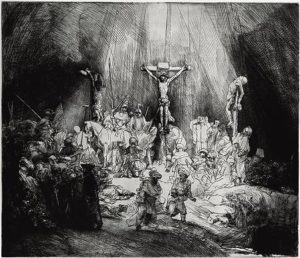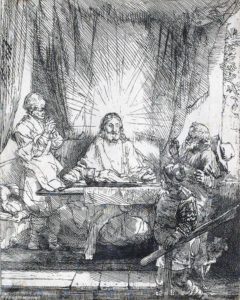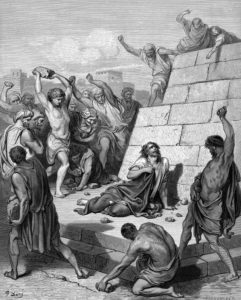ST PAUL AND JESUS
INTRODUCTION
A favourite way of attacking Christianity is to assert that it went downhill because of St Paul. He complicated the simple message of Jesus and made the church a guilt factory.
Apart from the fact that Jesus’ message was far from simple – tomes have been written about what he meant by “the kingdom of God” – it is worth asking how much of the real Jesus made its way into Paul’ preaching and writing.
SAUL AND JESUS
Saul/Paul started out as a persecutor of the new Jesus community, or as they called themselves, the followers of the Way. What was his take on Jesus at that point of his life?
At that time his identity was clear: “a Hebrew born of Hebrews; as to the law, a Pharisee; as to zeal a persecutor of the church; as to righteousness under the law, blameless.” (Philippians 3.5-6)
Saul’s attitude can be guessed at from the attitude of Jesus’ opponents among the Pharisees in Jesus’ lifetime – perhaps only two or three years before Saul started leading the persecution of the church in Jerusalem.
“He has Beelzebul, and by the ruler of the demons he casts out demons.” (Mark 3.22) In other words, he is a wizard, in league with the devil. This is proved by the fact that he does not keep the sabbath properly. “There are six days on which work ought to be done; come on those days and be cured, and not on the sabbath day.” (Luke 13.14) Finally, his death was the proof that he was not from God: “He saved others; he cannot save himself.” (Mark 15.31)
When a new Christian, Stephen, “a man full of faith and the Holy Spirit” was arrested and charged with attacking the temple and the law, he was handed over to a lynch mob to be stoned to death. “They dragged (Stephen) out of the city and began to stone him; and the witnesses laid their coats at the feet of a young man named Saul…And Saul approved of their killing him. (Then) Saul was ravaging the church by entering house after house; dragging off both men and women, he committed them to prison.” (Acts6.5; 7.58; 8.1, 3)
THE TURNING POINT
Saul was continuing his work as persecutor when he had an encounter with Jesus just outside Damascus. His entire life was turned upside down. But what did he know about Jesus himself? Probably very little. “I was violently persecuting the church of God and was trying to destroy it… But when God … was pleased to reveal his Son to me, so that I might proclaim him among the Gentiles, I did not confer with any human being , nor did I go up to Jerusalem to those who were already apostles before me, but I went away at once into Arabia, and afterwards I returned to Damascus. Then after three years I did go up to Jerusalem to visit Cephas (Peter) and stayed with him fifteen days, but I did not see any other apostle except James the Lord’s brother.” (Galatians 1.13-19, ed.)
Paul saw that the encounter on the Damascus road “as to one untimely born” (1 Corinthians 15.8) was with Jesus raised from the dead. This turned all his previous religious concepts upside down. The blasphemer was now the Messiah. Now he and the original apostles were singing from the same song sheet. “I worked harder than any of (the apostles)… Whether it was I or they, so we proclaim and so you have come to believe.” (1 Corinthians 15.10-11)
But what did Paul proclaim?
CHRIST CRUCIFIED
 First and foremost Paul proclaimed the scandalous death of Jesus on the cross.“I decided to know nothing among you except Jesus Christ and him crucified.” (1 Corinthians 2.2) He knew what a stumbling block the cross was for Jews, and what folly to Gentiles, and yet now Paul saw it as God’s great act of liberation. “Christ redeemed us from the curse of the law by becoming a curse for us – for it is written, Cursed be everyone who hangs on a tree.” (Galatians 3.13, Deuteronomy 21.23)
First and foremost Paul proclaimed the scandalous death of Jesus on the cross.“I decided to know nothing among you except Jesus Christ and him crucified.” (1 Corinthians 2.2) He knew what a stumbling block the cross was for Jews, and what folly to Gentiles, and yet now Paul saw it as God’s great act of liberation. “Christ redeemed us from the curse of the law by becoming a curse for us – for it is written, Cursed be everyone who hangs on a tree.” (Galatians 3.13, Deuteronomy 21.23)
Note: Christ is simply the Greek for Messiah or the Anointed One. Paul now understood that the task of the Messiah was to bring all peoples together in worship of God,and to be the agent of God’s final judgement of human history. “(God) has fixed a day on which he will have the world judged in righteousness by a man he has appointed, and of this he has given assurance to all by raising him from the dead.” (Acts 17.31)
CHRIST’S RESURRECTION
The earliest account we have of the resurrection of Jesus comes from Paul,  about 56 AD, in which he passed on what he has been told. “I handed on to you as of first importance what I in turn had received: that Christ died for our sins in accordance with the scriptures, and that he was buried, and that he was raised on the third day in accordance with the scriptures, and that he appeared to Cephas, then to the twelve. Then he appeared to more than five hundred brothers at one time, most of whom are still alive, though some have died. Then he appeared to James, then to all the apostles…” (1 Corinthians 15.3-7)
about 56 AD, in which he passed on what he has been told. “I handed on to you as of first importance what I in turn had received: that Christ died for our sins in accordance with the scriptures, and that he was buried, and that he was raised on the third day in accordance with the scriptures, and that he appeared to Cephas, then to the twelve. Then he appeared to more than five hundred brothers at one time, most of whom are still alive, though some have died. Then he appeared to James, then to all the apostles…” (1 Corinthians 15.3-7)
THE LAST SUPPER
The earliest account of the last supper comes from Paul, and again he refers back to earlier tradition. “I received from the Lord what I also handed on to you, that the Lord Jesus on the night when he was betrayed took a loaf of bread, and when he had given thanks, he broke it and said, ‘This is my body that is for you. Do this in remembrance of me.’ In the same way he took the cup also, after supper, saying, ‘This cup is the new covenant in my blood. Di this as often as you drink it, in remembrance of me.’”
(1 Corinthians 11.23-25)
TEACHING
We only have two examples of Jesus’ teaching from Paul. One is on marriage:
“To the married I give this command – not I but the Lord – that the wife should not separate form her husband (but if she does separate let her remain unmarried or else be reconciled to her husband), and that the husband should not divorce his wife.”
(1 Corinthians 7.10-11)
This clearly goes back to the challenging teaching of Jesus in Mark 10.11,12.
The other teaching is one not mentioned in the gospels. It comes in Paul’s speech to the elders of the community in Ephesus, recorded by Luke: “… remembering the words of the Lord Jesus, for he himself said, ‘It is more blessed to give than to receive.’” (Acts 20.35)
SUMMARY
We do not know what else Paul spoke about because by and large we only hear his replies to questions which the various young churches were asking him. But to have such detailed early witness to the Last Supper, the Cross and the Resurrection is a remarkable gift.

